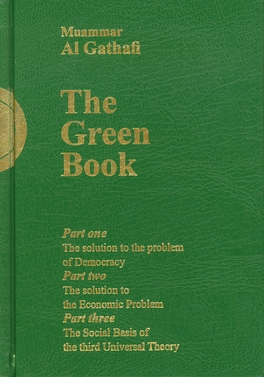Top Qs
Timeline
Chat
Perspective
The Green Book (Gaddafi)
1975 political philosophy book by Muammar Gaddafi From Wikipedia, the free encyclopedia
Remove ads
The Green Book (Arabic: الكتاب الأخضر al-Kitāb al-Aḫḍar) is a short book setting out the political philosophy of Libyan leader Muammar Gaddafi. The book was first published in 1975.[2] It is said to have been inspired in part by The Little Red Book (Quotations from Chairman Mao Tse-tung).[3][4] Both were widely distributed both inside and outside their country of origin, and "written in a simple, understandable style with many memorable slogans".[5]
An English translation was issued by the People’s Establishment for Publication, Distribution, and Advertising, an organ of the Libyan People's Committee,[6] and a bilingual English-Arabic edition was issued in London by Martin, Brian & O'Keeffe in 1976.
During the First Libyan Civil War in 2011, during which Gaddafi himself was killed, copies of the book were burned by anti-Gaddafi demonstrators,[7] and monuments to The Green Book demolished.[8]
Remove ads
Influence
In Libya
According to British author and former Greater London Council member George Tremlett, Libyan children spent two hours a week studying the book as part of their curriculum.[9] Extracts were broadcast every day on television and radio.[9] Its slogans were also found on billboards and painted on buildings in Libya.[9]
International
By 1993, lectures and seminars on The Green Book had been held at universities and colleges in France, Eastern Europe, Colombia, and Venezuela.[9]
On a state visit to Libya in 2008, socialist Bolivian President Evo Morales cited the Green Book as a major influence on his political beliefs and policies.[10]
Remove ads
Contents
Summarize
Perspective
The Green Book consists of three parts and has 110 pages:[9]
- The Solution of the Problem of Democracy: The Authority of the People (published in late 1975)
- The Solution of the Economic Problem: Socialism (published in early 1977)
- The Social Basis of the Third International Theory (published in September 1981)
Views
The Green Book rejects both capitalism and communism, as well as representative democracy. Instead, it proposes a type of direct democracy overseen by the General People's Committee which allows direct political participation for all adult citizens.[9][11]
The book states that "Freedom of expression is the natural right of every person, even if they choose to behave irrationally, to express his or her insanity."[12] The Green Book states that freedom of speech is based upon public ownership of book publishers, newspapers, television, and radio stations, on the grounds that private ownership would be undemocratic.[9]
A paragraph in the book about abolishing money is similar to a paragraph in Friedrich Engels' Principles of Communism.[13] Gaddafi wrote: "The final step is when the new socialist society reaches the stage where profit and money disappear. It is through transforming society into a fully productive society, and through reaching in production a level where the material needs of the members of society are satisfied. On that final stage, profit will automatically disappear and there will be no need for money."[14]
Remove ads
Summary
Summarize
Perspective
The following table gives a chapter-by-chapter summary of the book.
Remove ads
Reception
Summarize
Perspective
The examples and perspective in this section deal primarily with US and European academics and do not represent a worldwide view of the subject. (May 2015) |

George Tremlett has called the resulting media dull and lacking in a clash of ideas.[9] Dartmouth College Professor Dirk Vandewalle describes the book as more a collection of aphorisms than a systematic argument.[2] U.S. Ambassador David Mack called the book quite jumbled, with various ideas including "a fair amount of xenophobia" wrapped up in "strange mixture".[15]
Writing for the British Broadcasting Corporation, the journalist Martin Asser described the book as follows: "The theory claims to solve the contradictions inherent in capitalism and communism... In fact, it is little more than a series of fatuous diatribes, and it is bitterly ironic that a text whose professed objective is to break the shackles... has been used instead to subjugate an entire population."[12]
The book caused a scandal in 1987, when West German ice hockey club ECD Iserlohn, led by Heinz Weifenbach, signed a US$900,000 advertising deal for the book.[16]
On a 2008 visit to Libya, it was reported by Libyan state media that Bolivian President Evo Morales remarked "I read the Green Book, studied it and I am enthusiastic about the thinking spelled out in the Green Book".[17]
Remove ads
See also
References
External links
Wikiwand - on
Seamless Wikipedia browsing. On steroids.
Remove ads

